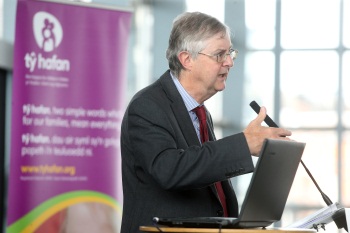A Welsh Government pledge for an extra £30m to combat delayed hospital discharges has been welcomed by the Royal College of Nursing (RCN) – but the union warns that “deep-rooted” problems are still yet to be addressed.
The country’s final budget for the 2025-26 financial year, which starts in April, has been published by the Welsh Government, after a draft was released to the public in December.
“Without urgent investment in nursing recruitment, retention, and fair pay, the pressures on frontline staff will persist”
Helen Whyley
The new version, which will be voted on in the Senedd in March, contains some further adjustments for some government departments.
Chief among the changes is an additional £60m increase for the health and social care budget, of which £30m is being given to social care.
Budget documents state that the £30 for social care is being used to target delayed discharges, which can lead to unnecessary long stays in hospital for patients and, in turn, additional pressures on ward staff including nurses.
An explanatory note stated that the money will be used to “provide more care and support in local communities”.
The £30m will be provided via a grant to local authorities.
“[The grant] will support assessments and provide packages of care to ensure people can leave hospital when they are medically fit to do so, helping to reduce the level of delayed hospital discharges,” the budget documents said.
“It will also strengthen community-based care services.”

Helen Whyley
This money is on top of the £435m (3.8%) increase to health and social care pledged in the draft budget. All in all, the final health and social care revenue budget for 2025-26 will stand at around £12bn.
Helen Whyley, executive director of RCN Wales, welcomed the news, but said it was “not clear” how the money would tackle “deep-rooted” and “system-wide” problems nurses and patients face.
“Nurses across Wales continue to work in overstretched hospitals where corridor care has become an unacceptable norm, compromising patient safety and staff wellbeing,” she said.
“Without urgent investment in nursing recruitment, retention and fair pay, the pressures on frontline staff will persist, and patients will continue to face unacceptable delays in receiving the care they need.”
Ms Whyley called on further improvements for social care packages to reduce the rate of hospital readmissions.
She added: “We must be able to deliver high quality preventative care in our communities, where we are seeing more complex health issues and isolated groups in rural areas, to reduce avoidable emergency care.
“Despite this positive step to strengthen resources and joined up working, Welsh government must address the growing concerns about the future of nursing education in Wales.”
The RCN Wales boss also said she would like to know if the Welsh Government was due to allocate any money for nursing education, following recent news that Cardiff University planned to close its nursing school in the coming years.
“Students are the future of the NHS in Wales and we must ensure that Wales remains an attractive place to train, work and live,” she said.
“We urge the Welsh Government to take bold action to address these systemic issues and ensure safe and sustainable nursing care for the people of Wales.”
Increases to the budget, between the draft and final version, were announced by cabinet secretary for finance Mark Drakeford yesterday, and came after negotiations between his Labour Party and Jane Dodds, the single Liberal Democrat member of the Senedd (MS).
To pass a budget, Labour – which has 30 out of 60 seats – requires a majority. Ms Dodds, after the publication of the draft budget, was identified as the potential deciding vote as Plaid Cymru, the Welsh Conservative Party and the single independent MS all indicated they would oppose it.
Ms Dodds described the amended budget as a “positive first step”, and declared that she would be abstaining from the vote, which will mean Labour’s budget is expected to pass with a slim majority.
The Welsh Government also announced a further £8.24m to the local government settlement, a block grant given to local authorities, which could also help improve social care services.
As well as this, £450,000 in capital funding was pledged to Powys Teaching Health Board to develop a business case for an “integrated health and social care centre” in Newtown.
Mr Drakeford, after the publication of the budget, said: “This agreement demonstrates what can be achieved when the Welsh Government and members of the Senedd work together constructively on areas where we have common ground.
“The additional investment will make a real difference to communities across Wales, particularly in rural areas.!

